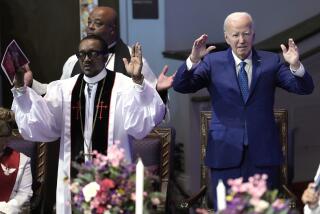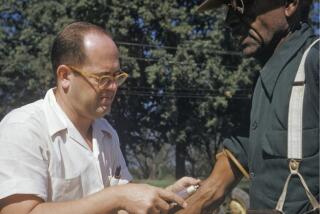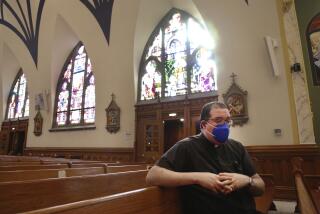Blacks More Religious Than Whites, Study Says
- Share via
They had the same amount of religious education as children, and have similar confidence in organized religion.
Yet in their daily lives, black Americans are more religious than white Americans, according to a comprehensive study of racial differences in religious practices.
Even allowing for factors such as income and regional differences, researchers found that African Americans are more likely to attend religious services, pray more often and say religion is important in their lives, according to the study reported in the Journal for the Scientific Study of Religion.
“There is a real race effect here,” said Robert Joseph Taylor of the Institute for Social Research at the University of Michigan.
Researchers Linda M. Chatters and Taylor of Michigan, Rukmalie Jayakody of Pennsylvania State University and Jeffrey S. Levin of Eastern Virginia Medical School examined six national studies done between 1976 and 1987 by the Institute for Social Research.
They also looked at data from 1972 to 1990 from the annual General Social Survey collected by the National Opinion Research Center at the University of Chicago.
Several studies have documented the importance of religion and religious institutions in the lives of black Americans, but there has been little research on racial differences in religious participation, the researchers said.
In addition, some national studies indicating that blacks are more religiously active than whites have left open the possibility the differences could be explained by factors other than race.
For example, blacks disproportionately reside in the South, the region of the country where religious participation is the highest. And, on average, people with lower incomes tend to be more religiously active than people with high incomes.
In the new research encompassing seven major studies, researchers reported generally higher levels of religious participation among blacks although there were no significant differences in the amount of religious instruction blacks and whites received growing up, and both races have equal levels of confidence in organized religion.
For example, in a 1978 Quality of American Life survey, 30% of blacks said they were very “religious minded,” contrasted with 16% of whites.
The 1986 Americans’ Changing Lives study found 39% of blacks read religious materials at least once a week; 23% of white respondents said they read religious materials as regularly. In the same study, 80% of blacks and 52% of whites said religion was very important.
When researchers factored in such criteria as income, religious affiliation and geographical distribution, the racial differences were diluted, but still were statistically significant.
Researchers said they could not explain why the racial differences persisted, but said they could reflect a larger role for the church in the lives of blacks. The black church has been active in addressing the social and political concerns--as well as the spiritual concerns--of its members.
“Religion, and religious participation, means a bit more to black people,” Taylor said. “That is the only institution that blacks totally control and totally participate in.”
Sociologist Christopher Ellison of the University of Texas said the study--which he called “the most exhaustive” ever of racial differences in religious practices--indicates how important the church is in the black community.
He said the bias among some academics that conventionally religious people are in general not well-educated and less affluent does not hold up among blacks.
“It’s the best-educated, the best-socialized members of the African-American community that are most active in their congregations,” he said.






